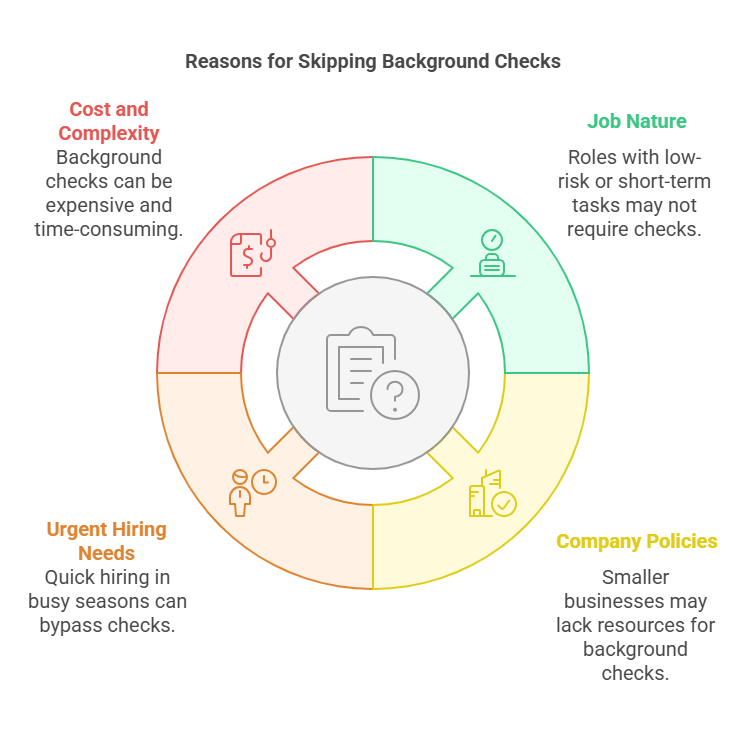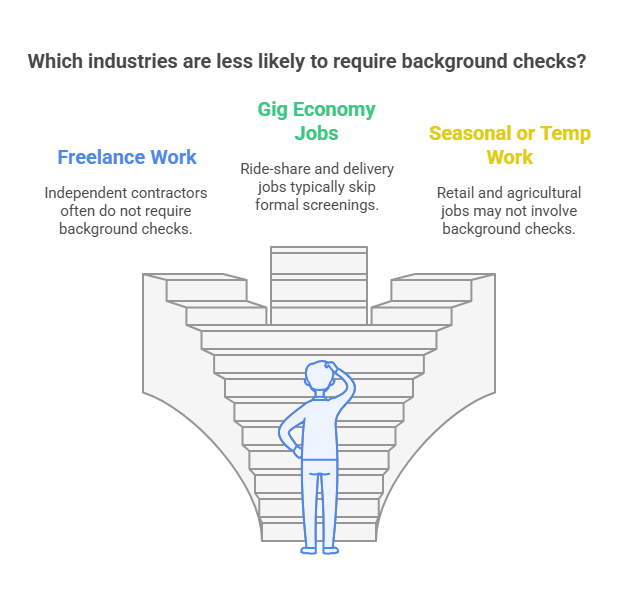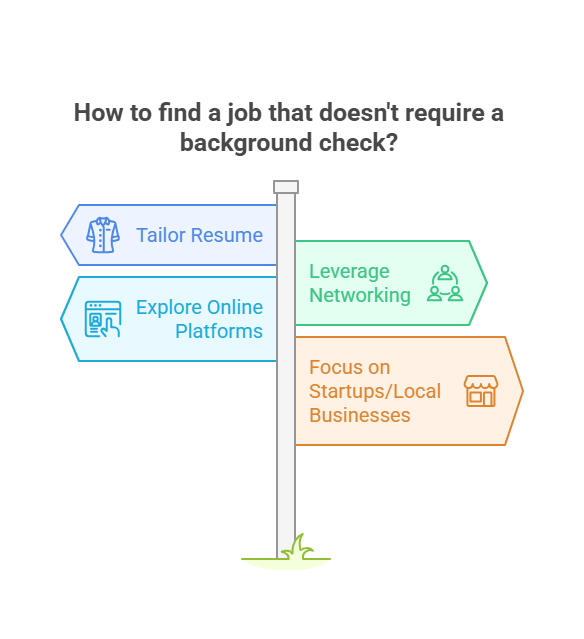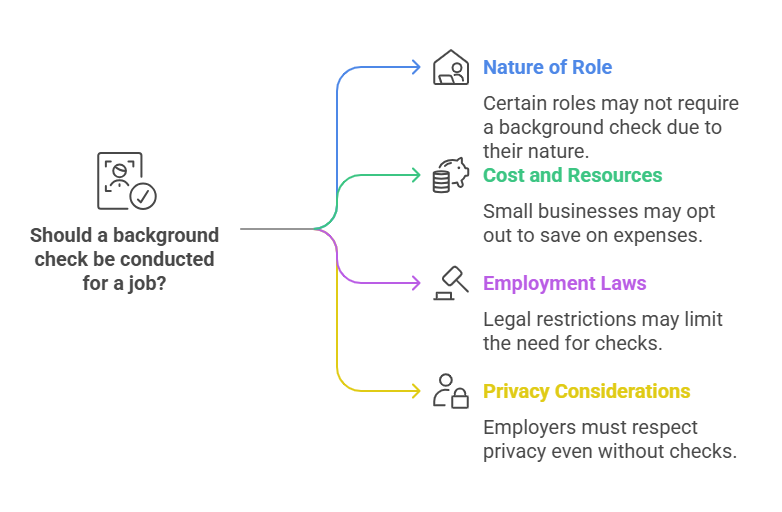Steps to Apply for Jobs That Skip Background Check

What Are Background Checks and Why Are They Conducted?
A background check is a process used by employers to verify a candidate’s personal, professional, and legal history. This typically includes examining:
- Criminal records
- Employment history
- Education verification
- Credit checks (for certain positions)
Employers conduct background checks to ensure a safe work environment, verify qualifications, and reduce potential risks to their business. However, not all jobs require background checks, and this opens up opportunities for individuals who might have difficulty passing them due to past legal issues or gaps in employment history.
Why Some Employers Don’t Require Background Checks

There are several reasons why certain employers or industries might not prioritize background checks:
- Job Nature: Roles that are temporary, freelance, or part of the gig economy may not necessitate extensive vetting due to their short-term or low-risk nature.
- Company Policies: Smaller businesses or startups may not have the resources or policies in place to conduct background checks.
- Urgent Hiring Needs: In labor-intensive industries or during busy seasons, employers may prioritize filling positions quickly over performing thorough background checks.
- Cost and Complexity: Conducting background checks can be expensive and time-consuming, so some companies may skip this step to save resources.
Industries and Jobs More Likely to Skip Background Checks

Several industries and job types are known for their minimal emphasis on background screening. These typically include:
- Freelance Work: Writers, graphic designers, and programmers often work as independent contractors without the need for background checks.
- Gig Economy Jobs: Ride-share drivers (e.g., Lyft, Uber), food delivery (e.g., DoorDash, Grubhub), and task-based platforms (e.g., TaskRabbit).
- Seasonal or Temp Work: Retail, holiday-based jobs, and agriculture.
- Construction and Manual Labor: Many positions in these fields focus on skills and work ethic over background checks.
- Startups and Small Businesses: Smaller companies may rely on personal interviews and references rather than formal screening processes.
Common Misconceptions About Jobs Without Background Checks
There are some myths surrounding roles that don’t require background checks:
- Misconception: “These jobs don’t pay well.”
- Reality: Many freelance and skilled labor jobs can offer competitive pay.
- Misconception: “These jobs are unprofessional.”
- Reality: Gig economy roles and startups often provide significant growth and networking opportunities.
- Misconception: “Only people with something to hide look for these jobs.”
- Reality: Many individuals pursue these roles for flexibility or out of necessity, not because of their background.
Examples of Job Categories That Don’t Typically Require Background Checks
- Freelance Roles: Writers, graphic designers, web developers.
- Gig Economy Jobs: Food delivery, ride-sharing, errand services.
- Seasonal or Temporary Work: Retail assistants during holidays, lifeguards, event staff.
- Manual Labor: Construction workers, warehouse operatives, landscapers.
- Creative Careers: Artists, musicians, independent filmmakers.
This diverse list highlights the wide range of opportunities available for individuals who want or need to avoid background checks.
Detailed List of Jobs That Typically Don’t Require Background Checks
Jobs that don’t require background checks can span across various industries, offering opportunities for different skill levels, work preferences, and schedules. Below is a breakdown of these roles:
1. Freelance Roles
Freelancing allows individuals to work independently, often on a project-by-project basis. Background checks are typically unnecessary because clients hire based on skills, portfolios, and reviews.
- Examples:
- Writers and editors
- Graphic designers and illustrators
- Web developers and software programmers
- Social media managers
- Average Pay: $25–$60 per hour (depending on expertise)
- Growth Opportunities: Building a strong client base and earning consistent income through networking and portfolio building.
2. Gig Economy Jobs
The gig economy thrives on flexible, task-based work that often bypasses stringent hiring protocols.
- Examples:
- Food delivery drivers (e.g., DoorDash, Uber Eats)
- Rideshare drivers (e.g., Lyft, Uber)
- Personal shoppers (e.g., Instacart)
- Task-oriented workers (e.g., TaskRabbit)
- Average Pay: $15–$25 per hour, with additional tips possible.
- Growth Opportunities: Building high ratings on platforms for better job opportunities and consistent work.
3. Labor-Intensive Jobs
Employers in construction, warehousing, and landscaping often prioritize skill and work ethic over background checks.
- Examples:
- Construction workers
- Landscapers and groundskeepers
- Warehouse associates
- Movers
- Average Pay: $15–$30 per hour.
- Growth Opportunities: Learning specialized skills (e.g., operating heavy machinery) can lead to higher pay and supervisory roles.
4. Seasonal or Temporary Work
Short-term positions are often filled quickly without extensive hiring processes, making them accessible to individuals without undergoing background checks.
- Examples:
- Retail associates during holidays
- Event staff for festivals or conferences
- Lifeguards during summer
- Agricultural workers during harvest seasons
- Average Pay: $10–$20 per hour.
- Growth Opportunities: Gaining seasonal work experience can lead to repeat employment offers or even permanent positions.
5. Startups and Small Businesses
Smaller companies often rely on personal interviews and practical assessments rather than extensive screening.
- Examples:
- Entry-level administrative assistants
- Marketing interns or associates
- Customer service representatives
- Average Pay: $12–$25 per hour.
- Growth Opportunities: Small businesses often offer hands-on learning and advancement opportunities within a tight-knit team.
6. Creative Careers
Jobs in the arts often focus on talent and portfolio quality over formal background checks.
- Examples:
- Artists and illustrators
- Musicians and performers
- Independent filmmakers
- Average Pay: Varies widely, often project-based.
- Growth Opportunities: Building recognition in the industry through successful projects or performances.
Comparison of Job Types That Don’t Require Background Checks
| Job Type | Average Pay | Growth Potential | Flexibility | Skill Requirements |
|---|---|---|---|---|
| Freelance Roles | $25–$60/hour | High | Very Flexible | Specialized skills |
| Gig Economy Jobs | $15–$25/hour | Moderate | Highly Flexible | Minimal skills required |
| Labor-Intensive Jobs | $15–$30/hour | Moderate to High | Moderate Flexibility | Physical fitness required |
| Seasonal/Temporary Work | $10–$20/hour | Low to Moderate | Flexible (short-term) | Basic skills or training |
| Startups/Small Businesses | $12–$25/hour | High | Moderate | Entry-level or adaptable |
| Creative Careers | Varies widely | High | Flexible (project-based) | Creative talent required |
Tips for Finding Jobs That Don’t Require Background Checks

Finding jobs that don’t perform background checks can be easier with the right strategy:
1. Tailor Your Resume
Focus on skills, accomplishments, and relevant experience. Highlight your abilities to make a strong first impression.
2. Leverage Networking
Connections are key, especially in industries like freelancing and creative work. Attend industry events or use platforms like LinkedIn to connect with potential clients or employers.
3. Explore Online Platforms
Websites and apps like:
- Upwork and Fiverr for freelancers.
- Uber and Instacart for gig economy roles.
- Indeed or Snagajob for seasonal and temporary work.
4. Focus on Startups and Local Businesses
Reach out to small businesses in your area or startups in industries of interest. These organizations often prioritize enthusiasm and adaptability over formal background checks.
The Role of Exactbackgroundchecks
While searching for jobs that don’t require background checks, understanding the screening process can still be valuable. Exactbackgroundchecks provides insights into background screening practices, helping both employers and job seekers:
- Employers can learn to streamline their hiring processes.
- Job seekers can identify industries and companies that align with their needs.
Exactbackgroundchecks also supports employers with compliance, making it a trusted partner for all background check-related services.
Legal Aspects Surrounding Jobs Without Background Checks

1. Why Background Checks Are Not Always Required
Employers are not legally obligated to perform background checks for every job. Factors influencing this decision include:
- Nature of the Role: Certain positions (e.g., freelance or gig work) don’t require a deep dive into a candidate’s history.
- Cost and Resources: Small businesses or startups may skip background checks to save on expenses.
- Employment Laws: In some industries, legal restrictions may limit or exclude the need for screening, especially for roles with no security or safety risks.
2. Federal and State Laws Impacting Background Checks
Legal guidelines play a crucial role in determining when and how background checks are conducted:
- Fair Credit Reporting Act (FCRA):
Employers must comply with the FCRA when conducting background checks. However, jobs that don’t involve screenings typically avoid FCRA complexities. - Equal Employment Opportunity (EEO) Laws:
Employers must avoid discriminatory practices during hiring, whether or not background checks are performed. - State and Local Laws:
- Some states have “ban-the-box” laws that limit when employers can ask about criminal history.
- Local regulations may also influence whether a background check is required for certain roles.
3. Confidentiality and Privacy Considerations
For jobs without background checks, employers still need to ensure they respect applicant privacy during the hiring process. Even without formal screenings, questions about personal history must adhere to legal and ethical standards.
FAQs About Jobs Without Background Checks
Why do some jobs not require background checks?
Certain jobs don’t require background checks because:
- They rely on skills, portfolios, or recommendations over formal history.
- They are in industries (e.g., gig economy or freelance) where trust is built through performance.
- Employers in these sectors may prioritize cost savings and faster hiring processes.
Are there risks for employers who don’t perform background checks?
Yes, employers may face risks, such as:
- Liability Concerns: Hiring without screening may expose the business to risks if the employee is unfit for the role.
- Reputational Damage: Misconduct by an unchecked hire could harm the company’s reputation.
However, these risks are minimized in industries where roles involve minimal trust or security concerns.
How can I find jobs that don’t perform background checks?
To find such jobs:
- Focus on freelance or gig platforms like Upwork, Fiverr, or TaskRabbit.
- Explore job boards like Indeed or Snagajob for entry-level or seasonal roles.
- Network with small businesses and startups.
Will a lack of background checks affect job security?
Job security is primarily influenced by performance and reliability rather than the presence of a background check. Consistently delivering quality work can help ensure long-term employment or repeat contracts.
Can I request that an employer skips a background check?
While you can make the request, the employer has the right to enforce their screening policies. If a background check is mandatory, opting out may disqualify you from consideration.
Why do some jobs not require background checks?
Certain jobs don’t require background checks because:
- They rely on skills, portfolios, or recommendations over formal history.
- They are in industries (e.g., gig economy or freelance) where trust is built through performance.
- Employers in these sectors may prioritize cost savings and faster hiring processes.
Are there risks for employers who don’t perform background checks?
Yes, employers may face risks, such as:
- Liability Concerns: Hiring without screening may expose the business to risks if the employee is unfit for the role.
- Reputational Damage: Misconduct by an unchecked hire could harm the company’s reputation.
However, these risks are minimized in industries where roles involve minimal trust or security concerns.
How can I find jobs that don’t perform background checks?
To find such jobs:
- Focus on freelance or gig platforms like Upwork, Fiverr, or TaskRabbit.
- Explore job boards like Indeed or Snagajob for entry-level or seasonal roles.
- Network with small businesses and startups.
Will a lack of background checks affect job security?
Job security is primarily influenced by performance and reliability rather than the presence of a background check. Consistently delivering quality work can help ensure long-term employment or repeat contracts.
Can I request that an employer skips a background check?
While you can make the request, the employer has the right to enforce their screening policies. If a background check is mandatory, opting out may disqualify you from consideration.
Conclusion
Jobs that don’t require background checks provide opportunities for individuals from diverse backgrounds, including those seeking fresh starts or flexible careers. Freelance roles, gig economy jobs, seasonal positions, and labor-intensive roles often prioritize skills and performance over history.
Legal considerations, including FCRA and EEO guidelines, influence the background check process, but many jobs avoid screenings due to cost, simplicity, or the nature of the work.
If you’re exploring such opportunities, it’s essential to:
- Identify the industries and roles that align with your skills.
- Build a strong portfolio and network.
- Use resources like Exactbackgroundchecks, which offers insights into hiring practices and compliance for employers and job seekers alike.



